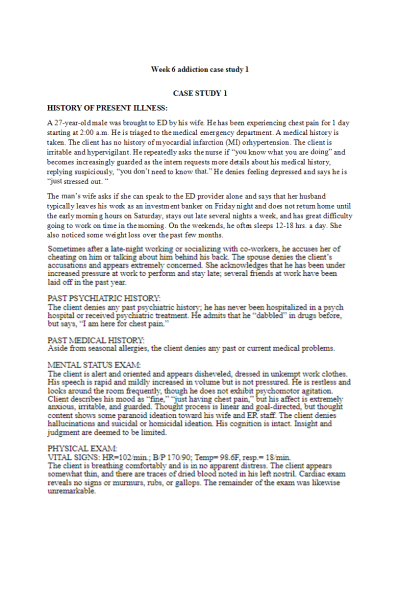HISTORY OF PRESENT ILLNESS:
A 37-year-old male was brought to ED by his partner. The client has been experiencing chest pain for 1 day, starting at 2:00 a.m. He is triaged to the medical emergency department. A medical history is taken. The client has no history of myocardial infarction (MI) or hypertension. The client is irritable and hypervigilant. He repeatedly asks the nurse if “you know what you are doing” and becomes increasingly guarded as the intern requests more details about his medical history, replying suspiciously, “you don’t need to know that.” He denies feeling depressed and says he is “just stressed out.” He is cooperative with ECG but is restless.
The man’s partner asks if she can speak to the ED provider alone and says that the client typically leaves his work as an investment banker on Friday night and does not return home until the early morning hours on Saturday, stays out late several nights a week, and has great difficulty going to work on time in the morning. On the weekends, he often sleeps 12-18 hrs. a day. She also noticed some weight loss over the past few months.
Sometimes after a late-night working or socializing with co-workers, he accuses her of cheating on him or talking about him behind his back. The partner denies the client’s accusations and appears extremely concerned. She acknowledges that he has been under increased pressure at work to perform and stay late; several friends at work have been laid off in the past year.
PAST PSYCHIATRIC HISTORY:
The client denies any past psychiatric history; he has never been hospitalized in a psych hospital or received psychiatric treatment. He admits that he “dabbled” in drugs recreationally but it’s not a problem. “I am here for chest pain.”
PAST MEDICAL HISTORY:
The client denies any past or current medical problems.
MENTAL STATUS EXAM:
The client is alert and oriented and appears disheveled, dressed in unkempt work clothes. His speech is rapid and mildly increased in volume but is not pressured. He is restless and looks around the room frequently, though he does not exhibit psychomotor agitation.
Client describes his mood as “fine,” “just having chest pain,” but his affect is extremely anxious, irritable, and guarded. Thought process is linear and goal-directed, but thought content shows some paranoid ideation toward his partner and ER staff. The client denies hallucinations and suicidal or homicidal ideation. His cognition is intact. Insight and judgment are deemed to be limited.
PHYSICAL EXAM:
VITAL SIGNS: HR=104/min.; B/P 170/95; Temp= 98.9F, resp.= 18/min.
The client is breathing comfortably and appears restless without obvious signs of distress. The client appears somewhat thin, and there are traces of dried blood noted in his left nostril. Cardiac exam reveals no signs or murmurs, rubs, or gallops. The remainder of the exam was likewise unremarkable.
NEUROLOGIC EXAM:
Cranial nerves 2-12 are intact. Pupils are dilated bilaterally.
A mild tremor is noted in both hands. No other abnormal movements are noted. There are no sensory or motor deficits. Gait is normal.
LAB. TESTING:
CPK= 60 micrograms mcg/L (WNL); other cardiac enzymes show no indication of MI.
DIAGNOSTIC TESTING:
EKG: Normal sinus rhythm at 100 bpm; flipped T waves in several leads. Chest x-ray normal.
Diagnosis: Stimulant Use Order (F15.20)
A.
Select one drug to treat the diagnosis(es) or symptoms.
B.
List medication class and mechanism
of action for the chosen medication.
C.
Write the prescription in prescription format.
D.
Provide an evidence-based rationale for the selected medication using at least
one scholarly reference. Textbooks
may be used for
E.
additional references but are not the primary
reference.
F.
List any side effects or adverse effects
associated with the medication.
G.
Include any required
diagnostic testing. State the time frame for this testing
(testing is before medication initiation or q 3 months, etc.). Includes
normal results range
for any listed laboratory tests.
H.
Provide a minimum
of three appropriate medication-related teaching points
for the client and/or family.


































